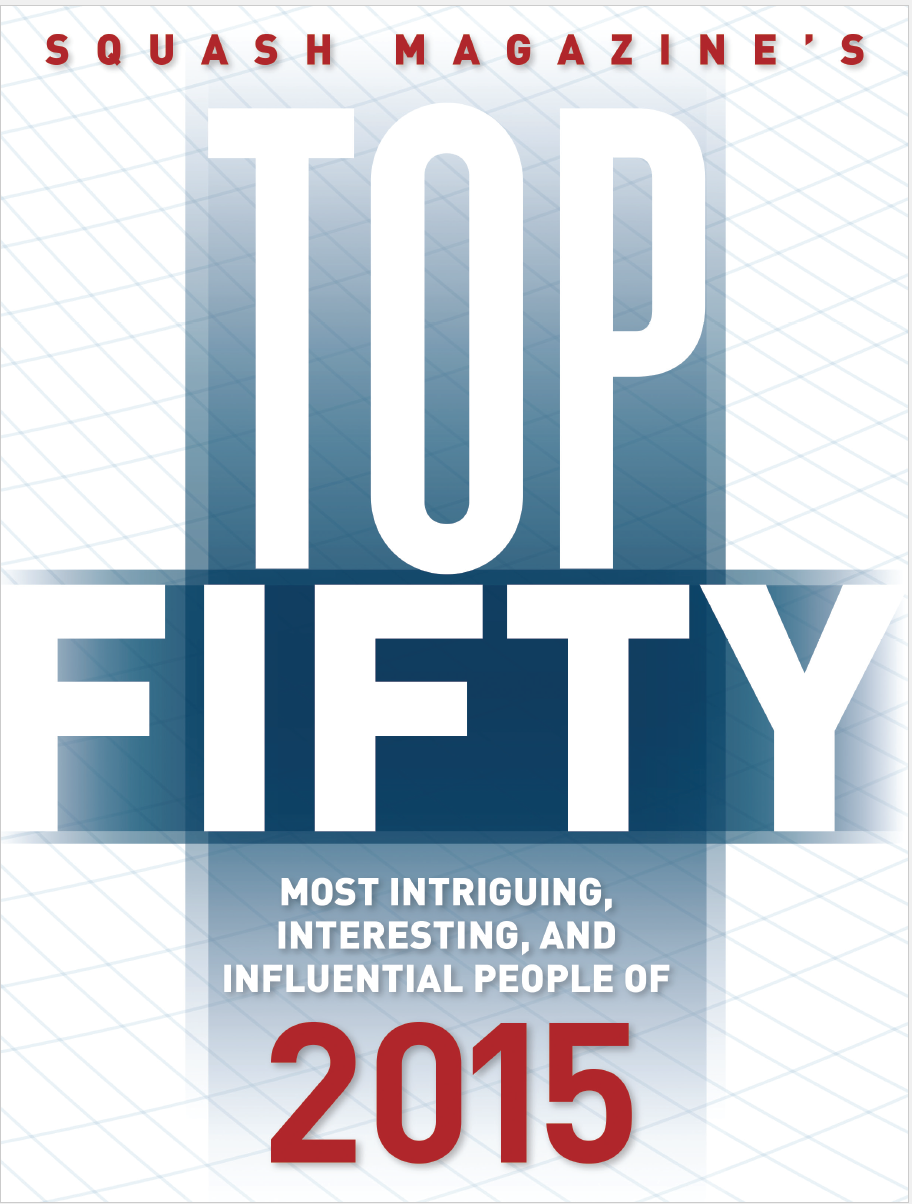In locker roomsand galleries, during van ridesand post-game chats, people talk about who does what in the game, about which celebrity is rumored to play, about which coach or player is more impactful on the game. For the second year in a row, Squash Magazine has finally put it down on paper. It wasn’t scientific. We had no algorithm. Caprice, whimsy and an eagle-eyed glance at the state of squash in America in 2015 provided the basis. We judged it, in order of importance, by intriguing and then interesting and then finally influential. Like last year, we know you’ll have suggestions of people we missed and people we should have left out and comments on the rankings. Send them to: letters@squashmagazine.com.
—The Editors
1. Amanda Sobhy
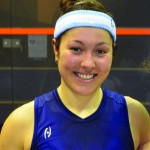 College was a good move for this Long Island native. She jumped from world No. 21 when she entered Harvard in 2011 to world No. 10 when she exited. The competition might not have been hard enough—she went 64-0, winning 192 games and losing just two—but the four years of college matured and broadened the anthropology major, giving her a stronger foundation to build a professional career. She is still based in Boston, still training with MIT coach and former world No. 1 Thierry Lincou. Already, she’s the best in this hemisphere: at the Pan-Am Games in Toronto, she grabbed three gold medals, the best individual performance since squash joined the Games in 1995. Now the real question: can the spunky southpaw become the first American to stand atop the world squash rankings? To some it is an if question; others just ask when.
College was a good move for this Long Island native. She jumped from world No. 21 when she entered Harvard in 2011 to world No. 10 when she exited. The competition might not have been hard enough—she went 64-0, winning 192 games and losing just two—but the four years of college matured and broadened the anthropology major, giving her a stronger foundation to build a professional career. She is still based in Boston, still training with MIT coach and former world No. 1 Thierry Lincou. Already, she’s the best in this hemisphere: at the Pan-Am Games in Toronto, she grabbed three gold medals, the best individual performance since squash joined the Games in 1995. Now the real question: can the spunky southpaw become the first American to stand atop the world squash rankings? To some it is an if question; others just ask when.
2. Paul Assaiante
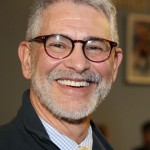 Last season Trinity College’s coach led the Bantams to their fifteenth national team title. He is just one short of the all-time collegiate record of national titles by college coaches, set byJack Barnaby in 1976. Assaiante’s record at Trinity is 382-19. Now sixty-three, he is still pulled in a bewildering number of directions: he is the Ganek Family US Squash Head National Coach and this summer spent more than two weeks in Canada and a week in Argentina coaching; he is on the board of Capitol Squash, the urban program in Hartford; and his wife, Julie, just gave birth to their third child in late spring. A bit of breathing room: he did retire this past spring as the Trinity men’s tennis team coach; in nineteen seasons at Trinity, Assaiante compiled a record of 197-102 and an overall career mark (with stints at Army and Williams) of 319-187
Last season Trinity College’s coach led the Bantams to their fifteenth national team title. He is just one short of the all-time collegiate record of national titles by college coaches, set byJack Barnaby in 1976. Assaiante’s record at Trinity is 382-19. Now sixty-three, he is still pulled in a bewildering number of directions: he is the Ganek Family US Squash Head National Coach and this summer spent more than two weeks in Canada and a week in Argentina coaching; he is on the board of Capitol Squash, the urban program in Hartford; and his wife, Julie, just gave birth to their third child in late spring. A bit of breathing room: he did retire this past spring as the Trinity men’s tennis team coach; in nineteen seasons at Trinity, Assaiante compiled a record of 197-102 and an overall career mark (with stints at Army and Williams) of 319-187
3. David Ganek
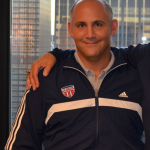 Last November David Ganek made headlines with a stunning $2 million gift to US Squash. The largest pledge in the 111-year history of the organization, the money established the Ganek Family US Squash Head National Coach Fund. The Ganeks, former Franklin & Marshall squash players, are longtime philanthropists. This transformative support will help Team USA become one of the world’s most dominant squash squads, now and for many generations to come, and will take the vision of Americans as world champions from a possibility to an eventuality.
Last November David Ganek made headlines with a stunning $2 million gift to US Squash. The largest pledge in the 111-year history of the organization, the money established the Ganek Family US Squash Head National Coach Fund. The Ganeks, former Franklin & Marshall squash players, are longtime philanthropists. This transformative support will help Team USA become one of the world’s most dominant squash squads, now and for many generations to come, and will take the vision of Americans as world champions from a possibility to an eventuality.
4. Jaffray Woodriff
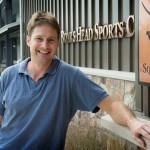 Woodriff’s creation, the McArthur Squash Center, has become a major site of activity, with amateur and pro singles and doubles events of international importance. Woodriff again hosted the National Singles in Charlottesville this past March; he played in the 45+ draw, winning one marathon match in the consolations 10-12, 9-11, 11-9, 11-3, 14-12. Now watch out for Virginia squash: last year, the women were ranked twenty-three and the men twenty-nine; both are poised for top-twenty finishes in 2015-16. As the pioneering team in the South, UVA is helping expand the collegiate game like no other.
Woodriff’s creation, the McArthur Squash Center, has become a major site of activity, with amateur and pro singles and doubles events of international importance. Woodriff again hosted the National Singles in Charlottesville this past March; he played in the 45+ draw, winning one marathon match in the consolations 10-12, 9-11, 11-9, 11-3, 14-12. Now watch out for Virginia squash: last year, the women were ranked twenty-three and the men twenty-nine; both are poised for top-twenty finishes in 2015-16. As the pioneering team in the South, UVA is helping expand the collegiate game like no other.
5. Brian Roberts
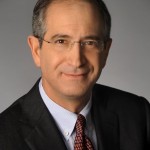 Roberts rose up from eighteen on the ladder as a freshman at Penn to All-American as a senior and secured a crucial win in a 5-4 Penn victory over Harvard. Roberts still plays—his one gold and four silver medals from the Maccabiah Games are one of the few decorations in his office—but he also spends time as chair and CEO of Comcast, the global entertainment
Roberts rose up from eighteen on the ladder as a freshman at Penn to All-American as a senior and secured a crucial win in a 5-4 Penn victory over Harvard. Roberts still plays—his one gold and four silver medals from the Maccabiah Games are one of the few decorations in his office—but he also spends time as chair and CEO of Comcast, the global entertainment
and communications company. Perhaps one of Comcast’s divisions, NBC, will feature squash when they broadcast the 2080 Summer Olympic Games?
6. John Fry
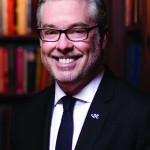 The president of Drexel and one of the most dynamic and visible leaders in Philadelphia today, Fry plays a key role at US Squash. He is chairman of the board and for the past five years has been the host of the association’s flagship national championship, the Delaware Investments United States Open. Another eight years at least are left with US Squash and Drexel’s U.S. Open partnership.
The president of Drexel and one of the most dynamic and visible leaders in Philadelphia today, Fry plays a key role at US Squash. He is chairman of the board and for the past five years has been the host of the association’s flagship national championship, the Delaware Investments United States Open. Another eight years at least are left with US Squash and Drexel’s U.S. Open partnership.
7. Danielle Maur
 Still the most powerful woman in squash in America, Maur is the national director of racquet sports for the world’s largest chain of squash clubs, Life Time Fitness. Today there are forty-one Life Time clubs with squash courts and the six-city Life Time Grand Prix Squash Tour blankets the country. Life Time has figured out a successful commercial squash model that will be key to the continued growth of the game.
Still the most powerful woman in squash in America, Maur is the national director of racquet sports for the world’s largest chain of squash clubs, Life Time Fitness. Today there are forty-one Life Time clubs with squash courts and the six-city Life Time Grand Prix Squash Tour blankets the country. Life Time has figured out a successful commercial squash model that will be key to the continued growth of the game.
8. John Nimick
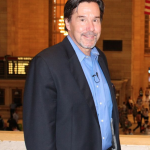 The director of the Tournament of Champions, Nimick has turned the world’s oldest men’s professional tournament into a paragon of parity. The 2015 edition had a full-draw for women for the first time since the event started in 1930; the 2016 ToC promises prize-money parity. And his younger event, the Netsuite Open in San Francisco, had a women’s draw for the first time.
The director of the Tournament of Champions, Nimick has turned the world’s oldest men’s professional tournament into a paragon of parity. The 2015 edition had a full-draw for women for the first time since the event started in 1930; the 2016 ToC promises prize-money parity. And his younger event, the Netsuite Open in San Francisco, had a women’s draw for the first time.
9. David Keating
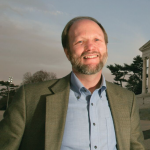 Keating, the president of National Capital Squash, continues to strengthen and develop one of the best-run district associations in the country. The NCS A team won the Howe Cup in November; the annual hardball singles event at the Metropolitan Club featured Sabrina Sobhy facing her older brother Omar; and the NCS still helps run the nation’s oldest inter-city match, the Fitzgerald Cup. What’s more, Amir Wagih’s Squash on Fire eight-court facility has broken ground on L Street in the West End.
Keating, the president of National Capital Squash, continues to strengthen and develop one of the best-run district associations in the country. The NCS A team won the Howe Cup in November; the annual hardball singles event at the Metropolitan Club featured Sabrina Sobhy facing her older brother Omar; and the NCS still helps run the nation’s oldest inter-city match, the Fitzgerald Cup. What’s more, Amir Wagih’s Squash on Fire eight-court facility has broken ground on L Street in the West End.
10. Jessica Helal
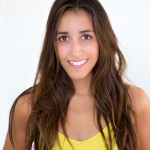 For the past year and a half, Helal has been the squash manager at Irvine’s Equinox fitness club in Orange County and Equinox’s club in West Los Angeles. The daughter of former world No. 21 Moussa Helal and sister of Trinity star Amina Helal, Jessica Helal is a burst of energy for the SoCal squash scene. She’s even helped create a high-school squash league for the city.
For the past year and a half, Helal has been the squash manager at Irvine’s Equinox fitness club in Orange County and Equinox’s club in West Los Angeles. The daughter of former world No. 21 Moussa Helal and sister of Trinity star Amina Helal, Jessica Helal is a burst of energy for the SoCal squash scene. She’s even helped create a high-school squash league for the city.
11. Gilly Lane
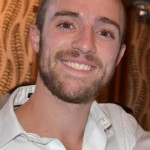 The master impersonator can’t be impersonated. @GLSquash has got 1,500 followers on Twitter (more than anyone on the Team USA squad that he helped coach to Pan-Am gold, except Amanda Sobhy). As associate head coach at Penn, he’s helped make the Quakers one of the strongest programs in the country, with two top-eight teams. New challenge: mastering the game of court tennis.
The master impersonator can’t be impersonated. @GLSquash has got 1,500 followers on Twitter (more than anyone on the Team USA squad that he helped coach to Pan-Am gold, except Amanda Sobhy). As associate head coach at Penn, he’s helped make the Quakers one of the strongest programs in the country, with two top-eight teams. New challenge: mastering the game of court tennis.
12. Hugh Jackman
 A Wolverine on and off the squash court, Jackman makes the largest leap on the Top Fifty, catapulting from fifty to twelve. Why? Not because his Twitter following is nearing the six million mark. Rather because the Australian actor plays squash more than you do. In the past half year, he’s been seen on court in New York and Paris and points in between. We are waiting for a match with Nick Matthew: the Wolverine v. the Wolf.
A Wolverine on and off the squash court, Jackman makes the largest leap on the Top Fifty, catapulting from fifty to twelve. Why? Not because his Twitter following is nearing the six million mark. Rather because the Australian actor plays squash more than you do. In the past half year, he’s been seen on court in New York and Paris and points in between. We are waiting for a match with Nick Matthew: the Wolverine v. the Wolf.
13. Todd Harrity
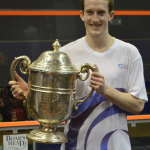 He’s just turned twenty-five and the sky’s the limit for professional Todd Harrity. His year-plus of training with Mo Reda at Merion paid off: in January 2014 he was ranked world No. 129; in September 2015 he was world No. 61. In March he won his first national singles title, upending nine-time champion Julian Illingworth in the semis and then 2013 champion Chris Gordon in a five-game final.
He’s just turned twenty-five and the sky’s the limit for professional Todd Harrity. His year-plus of training with Mo Reda at Merion paid off: in January 2014 he was ranked world No. 129; in September 2015 he was world No. 61. In March he won his first national singles title, upending nine-time champion Julian Illingworth in the semis and then 2013 champion Chris Gordon in a five-game final.
14. Natalie Grainger
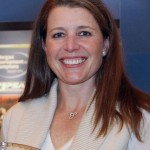 At age thirty-eight, Grainger could retreat to her squash castle at Chelsea Piers and feed balls ad infinitum. Instead, nearly five years after she retired from the pro tour, she anchored Team USA at the 2015 Pan Am Games. She snagged two gold medals to became the first American squash player ever to win a gold medal at two different Games. There is no peer
At age thirty-eight, Grainger could retreat to her squash castle at Chelsea Piers and feed balls ad infinitum. Instead, nearly five years after she retired from the pro tour, she anchored Team USA at the 2015 Pan Am Games. She snagged two gold medals to became the first American squash player ever to win a gold medal at two different Games. There is no peer
for her. Except Peer.
15. Mark Walter
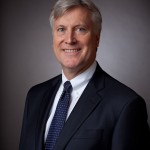 Guggenheim Partners, led by their CEO Mark Walter, helped lead the way to prize-money parity for women in 2015 and put Chicago and the Windy City Open on the map as a global leader of World Series professional events. Through their support, the tournament donates an average of $30,000 per year to Metrosquash, Chicago’s urban squash program.
Guggenheim Partners, led by their CEO Mark Walter, helped lead the way to prize-money parity for women in 2015 and put Chicago and the Windy City Open on the map as a global leader of World Series professional events. Through their support, the tournament donates an average of $30,000 per year to Metrosquash, Chicago’s urban squash program.
16. Chris Gordon
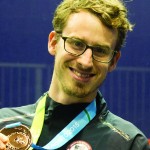 Incredibly, he’s now the senior statesman for Americans actively touring. Flash Gordon is still in his twenties but is the longest active pro, having joined the PSA in 2002. The world No. 59 is still on the move: in the past fifteen months, he’s played in England, Hong Kong, India, Mexico, U.S., Canada, Qatar, France, Guyana and Colombia. And in New York City—on an old outdoor handball court, as Gordon helps push for public squash.
Incredibly, he’s now the senior statesman for Americans actively touring. Flash Gordon is still in his twenties but is the longest active pro, having joined the PSA in 2002. The world No. 59 is still on the move: in the past fifteen months, he’s played in England, Hong Kong, India, Mexico, U.S., Canada, Qatar, France, Guyana and Colombia. And in New York City—on an old outdoor handball court, as Gordon helps push for public squash.
17. Marcy Axelrad
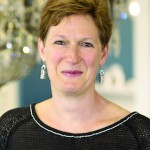 Another of those high-profile business leaders who happens to love squash, Axelrad is the senior director of global talent operations at Wayfair, the Boston-based e-commerce furniture giant.She picked up squash at McGill and now plays at least twice a week, including league matches for Equinox
Another of those high-profile business leaders who happens to love squash, Axelrad is the senior director of global talent operations at Wayfair, the Boston-based e-commerce furniture giant.She picked up squash at McGill and now plays at least twice a week, including league matches for Equinox
18. Kirsten Gillibrand
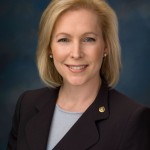 The junior senator from New York regularly plays squash in the morning before going across the Hill to help run the free world. She’s not only supportive when the NUSEA Citizenship Tour annually arrives in town, she’s becoming a squash mom, with her eleven-year-old son now picking up a racquet
The junior senator from New York regularly plays squash in the morning before going across the Hill to help run the free world. She’s not only supportive when the NUSEA Citizenship Tour annually arrives in town, she’s becoming a squash mom, with her eleven-year-old son now picking up a racquet
19. David Carr
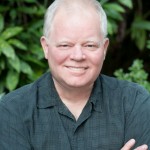 He helms McWil Squash Courts, the global building firm. Carr has an outstandingly varied resume (lobbyist; cucumber farming in Puerto Rico; fitness club manager). Today he has an absurd phone bill: calls to Australia, Egypt, Poland, Netherlands, South Korea, Cuba, Germany. And that was just last week. Latest project: designing an outdoor court.
He helms McWil Squash Courts, the global building firm. Carr has an outstandingly varied resume (lobbyist; cucumber farming in Puerto Rico; fitness club manager). Today he has an absurd phone bill: calls to Australia, Egypt, Poland, Netherlands, South Korea, Cuba, Germany. And that was just last week. Latest project: designing an outdoor court.
20. Mike Way
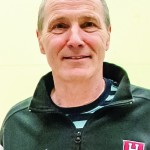 Some overseas teaching pros struggle when they become the head coach of a collegiate squash team. Not Mike Way. The Harvard coach enters his sixth season in Cambridge with four national titles already under his belt and an array of happy alumni, parents and players. The Way is the way.
Some overseas teaching pros struggle when they become the head coach of a collegiate squash team. Not Mike Way. The Harvard coach enters his sixth season in Cambridge with four national titles already under his belt and an array of happy alumni, parents and players. The Way is the way.
21. Linda Elriani
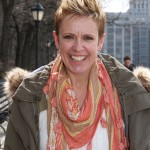 At the 2015 JP Morgan Tournament of Champions, Elriani (nee Charman) received the ToC’s Women’s Squash Leadership Award. The former world No. 3 is the head pro at the Heights Casino where she directs the Carol Weymuller and the Johnson, two of America’s premier squash events, and oversees one of the most active junior programs in the nation.
At the 2015 JP Morgan Tournament of Champions, Elriani (nee Charman) received the ToC’s Women’s Squash Leadership Award. The former world No. 3 is the head pro at the Heights Casino where she directs the Carol Weymuller and the Johnson, two of America’s premier squash events, and oversees one of the most active junior programs in the nation.
22. Richard Millman
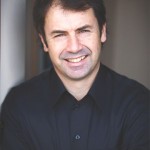 The squash doctor is in. Millman received the USOC Developmental Coach of the Year Award at the 2015 National Singles in recognition of his quarter century of teaching in the U.S., whether with juniors, collegiate players, adults or readers of this magazine.
The squash doctor is in. Millman received the USOC Developmental Coach of the Year Award at the 2015 National Singles in recognition of his quarter century of teaching in the U.S., whether with juniors, collegiate players, adults or readers of this magazine.
23. Ted Gross
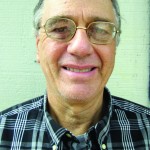 He played at Cal Berkeley, coached at Uptown and was on Team USA when they finished seventh at the 1981 World Championships, still the highest finish ever for an American men’s team. In April 2011 Gross launched Daily Squash Report, now one of the world’s leading squash websites with many thousands of daily visitors. If it is about squash, it is on DSR.
He played at Cal Berkeley, coached at Uptown and was on Team USA when they finished seventh at the 1981 World Championships, still the highest finish ever for an American men’s team. In April 2011 Gross launched Daily Squash Report, now one of the world’s leading squash websites with many thousands of daily visitors. If it is about squash, it is on DSR.
24. Laura Trevelyan
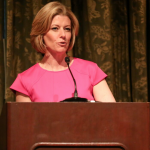 With aplomb and humor, she emceed the largest dinner in the history of squash, the January 2015 NUSEA 20th anniversary celebration in New York. The BBC World News America anchor is a squash mom—her three sons play. She’s active with CitySquash: she’s on the board of the Brooklyn branch of CitySquash and this summer she co-chaired the Bash, which raised a record $1.12 million. But watch out. Her ancestor invented the Winchester rifle.
With aplomb and humor, she emceed the largest dinner in the history of squash, the January 2015 NUSEA 20th anniversary celebration in New York. The BBC World News America anchor is a squash mom—her three sons play. She’s active with CitySquash: she’s on the board of the Brooklyn branch of CitySquash and this summer she co-chaired the Bash, which raised a record $1.12 million. But watch out. Her ancestor invented the Winchester rifle.
25. Shabana Khan
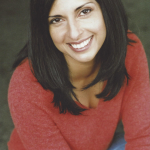 She reached world No. 23 but that will be nothing compared with pulling off hosting the men’s 2015 World Championship in her native Seattle. The U.S. has only been the site of three other world events, so Khan heads into unknown territory. With a $350,000 purse, it promises to be the richest tournament in squash history.
She reached world No. 23 but that will be nothing compared with pulling off hosting the men’s 2015 World Championship in her native Seattle. The U.S. has only been the site of three other world events, so Khan heads into unknown territory. With a $350,000 purse, it promises to be the richest tournament in squash history.
26. Stephen Green
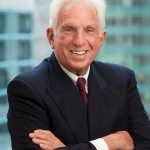 Known for his eponymous trophy, the SL Green, that he gave in 1990—offering prize money for the first time for the men’s National Singles—Green has even jumped back in to support the event at UVA for the past couple of years. He serves on the board of StreetSquash’s Harlem branch and gave the major gift that led to the building of the SL Green StreetSquash Center, New York’s largest squash facility.
Known for his eponymous trophy, the SL Green, that he gave in 1990—offering prize money for the first time for the men’s National Singles—Green has even jumped back in to support the event at UVA for the past couple of years. He serves on the board of StreetSquash’s Harlem branch and gave the major gift that led to the building of the SL Green StreetSquash Center, New York’s largest squash facility.
27. Nancy Cushman
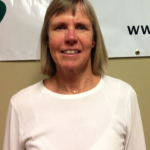 Reproduce the forty thousand square foot, sixteen-court magic of Meadow Mill around the country and you’ve got a brand-new sport. Cushman is the owner and visionary who, for a quarter century, has kept independent, commercial squash a viable option in the U.S. She is a key supporter of SquashWise and has hosted many national championships.
Reproduce the forty thousand square foot, sixteen-court magic of Meadow Mill around the country and you’ve got a brand-new sport. Cushman is the owner and visionary who, for a quarter century, has kept independent, commercial squash a viable option in the U.S. She is a key supporter of SquashWise and has hosted many national championships.
28. Bill Simon
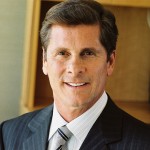 Simon, awarded the President’s Cup in January, is the chair of NUSEA and threw a NUSEA party for nearly a thousand people in New York last winter. Along with his wife Cindy, he is a co-founder of the Sound Mind Sound Body Foundation. A nation-wide resource for schools and physical education teachers that fights childhood obesity by initiating fitness programs, Sound Mind Sound Body has more than a hundred fitness centers serving more than 100,000 students a year.
Simon, awarded the President’s Cup in January, is the chair of NUSEA and threw a NUSEA party for nearly a thousand people in New York last winter. Along with his wife Cindy, he is a co-founder of the Sound Mind Sound Body Foundation. A nation-wide resource for schools and physical education teachers that fights childhood obesity by initiating fitness programs, Sound Mind Sound Body has more than a hundred fitness centers serving more than 100,000 students a year.
29. Ted Price
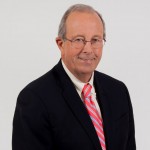 The southern gentlemen who has been behind nearly every bit of growth in Richmond squash, Price is, among other things, the founder and tournament director of the Price-Bullington Invitational. This month the PBI celebrates the forty-fifth anniversary of its start in 1970
The southern gentlemen who has been behind nearly every bit of growth in Richmond squash, Price is, among other things, the founder and tournament director of the Price-Bullington Invitational. This month the PBI celebrates the forty-fifth anniversary of its start in 1970
30. Dominic Hughes
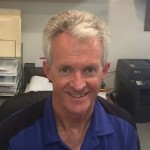 Owner and manager of Berwyn, Hughes keeps the Philadelphia commercial club, the oldest in the country, humming along at an astonishing pace. He also continues to dominate on court; last spring he won the men’s 50+ in both singles and doubles.
Owner and manager of Berwyn, Hughes keeps the Philadelphia commercial club, the oldest in the country, humming along at an astonishing pace. He also continues to dominate on court; last spring he won the men’s 50+ in both singles and doubles.
31. Michael Pierce
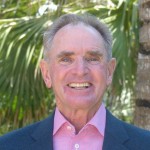 A 2015 inductee into the U.S. Squash Hall of Fame, Pierce overcame a freak bacterial illness this past winter (necrotizing fasciitis) to come back to full health. He continues to run the women’s pro doubles event in Florida and stays involved with urban squash—he was the first major donor to the original program, SquashBusters, back in 1995.
A 2015 inductee into the U.S. Squash Hall of Fame, Pierce overcame a freak bacterial illness this past winter (necrotizing fasciitis) to come back to full health. He continues to run the women’s pro doubles event in Florida and stays involved with urban squash—he was the first major donor to the original program, SquashBusters, back in 1995.
32. Gordon Anderson
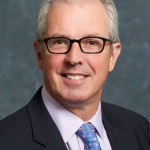 Since 1987, the Canadian-American has built nearly a thousand squash courts in America. This past year he’s done courts in CA, CT, IL, ME, MD, MA, MI, NY, NC, OH, PA, SD and VA, as well as Canada and Panama. This past winter he added another trophy to his crowded shelf with a victory in the 65+ at the National Doubles—the fifth different masters division he’s captured in his doubles career
Since 1987, the Canadian-American has built nearly a thousand squash courts in America. This past year he’s done courts in CA, CT, IL, ME, MD, MA, MI, NY, NC, OH, PA, SD and VA, as well as Canada and Panama. This past winter he added another trophy to his crowded shelf with a victory in the 65+ at the National Doubles—the fifth different masters division he’s captured in his doubles career
33. John Flanigan
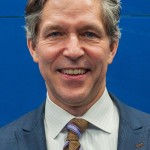 Flanigan knows how to run major squash events. In the mid-1990s he directed the U.S. Open in Minneapolis for two years and now is leading the Windy City Open, the star-studded, prize-money parity event. Since 1999 he’s been running the squash program at the University Club of Chicago and, in 2014, led the U Club to become the first club in the world to adopt Club Locker, US Squash’s innovative digital system.
Flanigan knows how to run major squash events. In the mid-1990s he directed the U.S. Open in Minneapolis for two years and now is leading the Windy City Open, the star-studded, prize-money parity event. Since 1999 he’s been running the squash program at the University Club of Chicago and, in 2014, led the U Club to become the first club in the world to adopt Club Locker, US Squash’s innovative digital system.
34. Connie Barnes
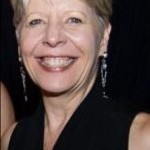 Unafraid to rock the boat, Barnes is the hard-paddling director of squash at the Chevy Chase Athletic Club outside Washington, DC, coach of school teams and the owner of the Charlotte Squash Club in North Carolina. An Australian native, Barnes is also the mother of Jackie, Dartmouth’s No. 1 player.
Unafraid to rock the boat, Barnes is the hard-paddling director of squash at the Chevy Chase Athletic Club outside Washington, DC, coach of school teams and the owner of the Charlotte Squash Club in North Carolina. An Australian native, Barnes is also the mother of Jackie, Dartmouth’s No. 1 player.
35. Deb Hodes
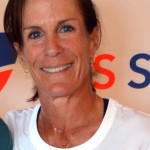 The former Princeton star won the inaugural women’s 55+ at the National Singles this past winter. A long time leader in the game, Hodes was the chief supporter of the effort to create the Robert W. Callahan Sportsmanship Award.
The former Princeton star won the inaugural women’s 55+ at the National Singles this past winter. A long time leader in the game, Hodes was the chief supporter of the effort to create the Robert W. Callahan Sportsmanship Award.
36. Peter Briggs
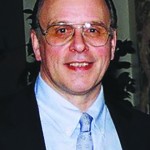 Doubles legend, beloved mentor and bon vivant, Briggs has led the massive and massively successful program at Apawamis for over a quarter century. He also directs his eponymous doubles event, which has produced the richest purse in American squash history.
Doubles legend, beloved mentor and bon vivant, Briggs has led the massive and massively successful program at Apawamis for over a quarter century. He also directs his eponymous doubles event, which has produced the richest purse in American squash history.
37. Tim Wyant
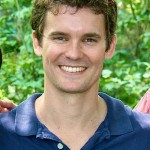 Famous for being the last guy to win a fifth match versus Trinity before their fifteen-year unbeaten streak began, Wyant is the executive director of NUSEA. Under his direction since 2012, NUSEA has nearly doubled in size as Wyant helps sustain existing programs and seed new ones around the world.
Famous for being the last guy to win a fifth match versus Trinity before their fifteen-year unbeaten streak began, Wyant is the executive director of NUSEA. Under his direction since 2012, NUSEA has nearly doubled in size as Wyant helps sustain existing programs and seed new ones around the world.
38. Mark Hayden
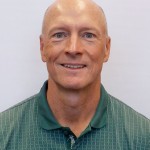 The founder of Harrow Sports, Hayden continues to push squash across new frontiers. For many years, Harrow has sponsored Raneem El Welily, now the new world No. 1. And what dancing bear doesn’t want the new Grateful Dead squash racquet?
The founder of Harrow Sports, Hayden continues to push squash across new frontiers. For many years, Harrow has sponsored Raneem El Welily, now the new world No. 1. And what dancing bear doesn’t want the new Grateful Dead squash racquet?
39. John Hickenlooper
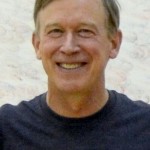 Perhaps the best squash-playing pol in the country, Colorado governor Hickenlooper attended squash powerhouse Haverford School but didn’t get serious about squash until he moved to Denver. A founder of Mile High Squash, Hickenlooper played in the 60+ at the National Doubles last winter, losing one heart-breaking match 15-14 in the fifth.
Perhaps the best squash-playing pol in the country, Colorado governor Hickenlooper attended squash powerhouse Haverford School but didn’t get serious about squash until he moved to Denver. A founder of Mile High Squash, Hickenlooper played in the 60+ at the National Doubles last winter, losing one heart-breaking match 15-14 in the fifth.
40. Olivia Blatchford
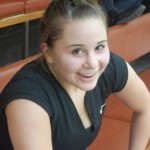 Blatchford, the world No. 37, stunned the hemisphere when she toppled 2011 gold medalist Samantha Teran in the 2015 Pan Am Games, earning herself a silver medal. She also won a gritty match to secure the gold medal for the U.S. in the women’s team event. Blatchford now boasts four Pan Am medals from two different Games—and she’s still only twenty-two
Blatchford, the world No. 37, stunned the hemisphere when she toppled 2011 gold medalist Samantha Teran in the 2015 Pan Am Games, earning herself a silver medal. She also won a gritty match to secure the gold medal for the U.S. in the women’s team event. Blatchford now boasts four Pan Am medals from two different Games—and she’s still only twenty-two
41. Cass Sunstein
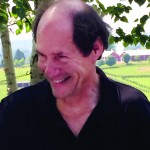 How many sixty-one year-olds play in pro singles events? Earlier this year Sunstein, law professor, author and husband of former Yale squash player and U.N. Ambassador Samantha Power, played in the qualies of a pro event in Charlotte and then wrote about it in the Atlantic. Highest world ranking in squash? 369. Ranking in number of citations in legal scholarship? 1.
How many sixty-one year-olds play in pro singles events? Earlier this year Sunstein, law professor, author and husband of former Yale squash player and U.N. Ambassador Samantha Power, played in the qualies of a pro event in Charlotte and then wrote about it in the Atlantic. Highest world ranking in squash? 369. Ranking in number of citations in legal scholarship? 1.
42. Tom Poor
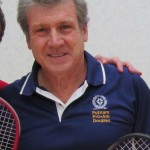 The Hall of Famer continues to wow friends with his on-court sartorial choices and all of the country with his administrative energy and acumen. He runs junior activities for Massachusetts Squash, setting the bar very high, especially at the Frank Millet JCT, which is considered one of the best-run tournaments in the country. A board member for Mass Squash for more than forty years, Poor also has served on the board of SquashBusters since it began in 1996 and is on US Squash’s investment committee.
The Hall of Famer continues to wow friends with his on-court sartorial choices and all of the country with his administrative energy and acumen. He runs junior activities for Massachusetts Squash, setting the bar very high, especially at the Frank Millet JCT, which is considered one of the best-run tournaments in the country. A board member for Mass Squash for more than forty years, Poor also has served on the board of SquashBusters since it began in 1996 and is on US Squash’s investment committee.
43. Scott Stossel
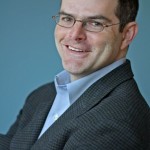 Stossel, the managing editor of the Atlantic, is a longtime and avid league player in Washington, DC. He is the author of two books, including the Age of Anxiety in which he delves into how anxiety can help and hinder your squash performance.
Stossel, the managing editor of the Atlantic, is a longtime and avid league player in Washington, DC. He is the author of two books, including the Age of Anxiety in which he delves into how anxiety can help and hinder your squash performance.
44. Praveen Kankariya
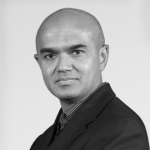 A US Squash board member, Kankariya is the founder and CEO of Impetus, a leading technology services company. As a hobby, he has converted a racquetball facility in Los Gatos, CA, in an effort to spur squash south of the San Francisco Bay Area. Leading the way on racquetball conversions, Kankariya has created a club with a heated pool, state-of-the-art fitness and a world-famous teaching pro: Rahmat Khan, the former world No.12 and Jahangir Khan’s coach.
A US Squash board member, Kankariya is the founder and CEO of Impetus, a leading technology services company. As a hobby, he has converted a racquetball facility in Los Gatos, CA, in an effort to spur squash south of the San Francisco Bay Area. Leading the way on racquetball conversions, Kankariya has created a club with a heated pool, state-of-the-art fitness and a world-famous teaching pro: Rahmat Khan, the former world No.12 and Jahangir Khan’s coach.
45. Chris Smith
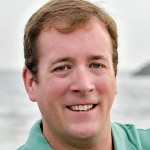 A lot of formers with Smith: former Team USA coach, Bates, Harvard and Northeastern coach, SquashBusters staffer, U.S. Open emcee and Union Boat pro. Currently Smith is the coach at St. Paul’s School. While at the oldest squash locale in the country, he’s embracing new technology like Club Locker and streaming and filming video on iPads. He also directs the Steamer, the classic Newport summer squash tournament.
A lot of formers with Smith: former Team USA coach, Bates, Harvard and Northeastern coach, SquashBusters staffer, U.S. Open emcee and Union Boat pro. Currently Smith is the coach at St. Paul’s School. While at the oldest squash locale in the country, he’s embracing new technology like Club Locker and streaming and filming video on iPads. He also directs the Steamer, the classic Newport summer squash tournament.
46. Hope Prockop
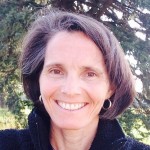 Prockop, who plays out of the Concord-Acton Squash Club, had a remarkable season. She won both the 40+ and 45+ at the National Singles last winter. One of the few women to have captured the 35+, 40+ and 45+, Prockop now has seven national masters titles. She also won, unseeded, the 45+ draw at the 2015 British Open. Just wait until she turns fifty.
Prockop, who plays out of the Concord-Acton Squash Club, had a remarkable season. She won both the 40+ and 45+ at the National Singles last winter. One of the few women to have captured the 35+, 40+ and 45+, Prockop now has seven national masters titles. She also won, unseeded, the 45+ draw at the 2015 British Open. Just wait until she turns fifty.
47. Wendy Lawrence
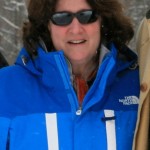 The longtime Washington cynosure, Lawrence is the head coach at George Washington and one of the few women in the country to coach a men’s team. As president of the women’s College Squash Association, she’s helping lead the development of the CSA into uncharted territory like neutral-site championships.
The longtime Washington cynosure, Lawrence is the head coach at George Washington and one of the few women in the country to coach a men’s team. As president of the women’s College Squash Association, she’s helping lead the development of the CSA into uncharted territory like neutral-site championships.
48. Gail Ramsay
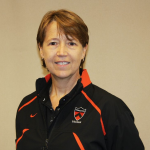 Her record of four straight national intercollegiate individual titles has been equaled a second time, by Amanda Sobhy, but it can’t ever be broken. The longtime Princeton coach continues to mentor young student-athletes as she looks for her sixth national team title.
Her record of four straight national intercollegiate individual titles has been equaled a second time, by Amanda Sobhy, but it can’t ever be broken. The longtime Princeton coach continues to mentor young student-athletes as she looks for her sixth national team title.
49. Chris Hanson
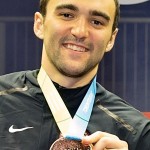 A year ago, Hanson was ranked world No. 244; he’s now No. 85 and climbing. The southpaw won two medals at the Pan Am Games and continues to impress.
A year ago, Hanson was ranked world No. 244; he’s now No. 85 and climbing. The southpaw won two medals at the Pan Am Games and continues to impress.
50. Gus Hansen
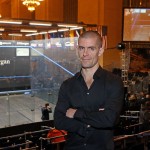 Hansen is a professional poker legend. He also helps fund squash tournaments in Monaco, is close to the Dutch team and is more often found backstage at a squash tournament than anywhere else. He’s also the second person, so far, to be named to both the Squash Magazine Top Fifty and to People Magazine’s Fifty Sexiest Men. The first? See No. 12.
Hansen is a professional poker legend. He also helps fund squash tournaments in Monaco, is close to the Dutch team and is more often found backstage at a squash tournament than anywhere else. He’s also the second person, so far, to be named to both the Squash Magazine Top Fifty and to People Magazine’s Fifty Sexiest Men. The first? See No. 12.


